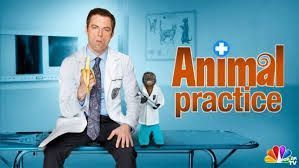 Defendants in questionable infringement cases should rejoice because another judge has dismissed – with prejudice – at the early stages of litigation a copyright infringement lawsuit filed against NBC’s Animal Practice television show. The litigation lasted longer than the seven weeks the show was on the air before being cancelled. Last year, Judge Real also dismissed with prejudice a questionable trademark infringement lawsuit filed by Spearmint Rhino against Chiappa guns for using a rhino logo on a gun, finding that there is no way consumers are likely to be confused by the respective rhino logos on disparate goods and services.
Defendants in questionable infringement cases should rejoice because another judge has dismissed – with prejudice – at the early stages of litigation a copyright infringement lawsuit filed against NBC’s Animal Practice television show. The litigation lasted longer than the seven weeks the show was on the air before being cancelled. Last year, Judge Real also dismissed with prejudice a questionable trademark infringement lawsuit filed by Spearmint Rhino against Chiappa guns for using a rhino logo on a gun, finding that there is no way consumers are likely to be confused by the respective rhino logos on disparate goods and services.
This time Judge O’Connell determined that Paul Andre’s seven-page treatment for PETS, a sitcom set in an after-hours veterinary clinic, could not maintain a copyright infringement claim despite despite an opportunity to file a First Amended Complaint. The Court took judicial notice of common elements of a veterinary hospital, including an operating room, examining room, a lobby, and pets, and also took judicial notice of the tone that is common to comedic television shows, such as the pace and romantic relationships. If “the copyrighted work and the alleged infringement are both before the court, capable of examination and comparison, non-infringement can be determined on a motion to dismiss.” Christianson v. West Pub. Co., 149 F.2d 202, 203 (9th Cir. 1945).
The Court found that the elements alleged by Andre were too generic to be protectable and are scenes a faire flowing from an animal hospital. Funky Films, v. Time Warner Ent., 462 F.3d 1072, 1081 (9th Cir. 2006) (holding that there was no protection for similar plots involving “the family-run funeral home, the father’s death, and the return of the ‘prodigal son,’ who assists his brother in maintaining the family business”). The Court found that Animal Practice and PETS had distinct plots without any similarity, “much less substantial similarity, between any expressive elements in the works.” In PETS, the characters worked in an after-hours clinic in L.A. that was always strapped for cash and had interwoven courtroom scenes describing how the pets were injured. In Animal Practice, the characters worked at a NY city hospital catering to the wealthy and focused more on the relationships of the staff and owners than the pets. Thus, the commonalities between the situations and incidents in the two works “flow naturally from [the] basic plot premise” of a television show about an animal hospital. Berkic v. Crichton, 761 F.2d 1289, 1293 (9th Cir. 1985). Even two similar story fragments of “a Halloween costume contest for pets at the clinic, and an issue about a pet eating chocolate,” did not provide a basis for substantial similarity because Animal Practice’s expressive details of the story idea was different.
The Court also determined the themes were too generic to be protectable because they are common to other comedic shows, in addition to being randomly scattered throughout the works. Mood, pace, and dialogue were also deemed to be non-protectable elements common to sitcoms with ensemble casts. Moreover, PETS was a treatment without any dialogue and could not be compared to Animal Practice’s fully developed TV show. The characters, i.e. veterinarians, nurses, and pets, including the resident pet at the clinic (a capuchin monkey vs. a dog) were generic and not entitled to protection or sufficiently dissimilar. Thus, the Court dismissed the case with prejudice. A copy of the order is available here.
The case is DuckHole, Inc. v. NBCUniversal Media LLC, et al., CV12-10077 JAK (C.D. Cal. 2012).
 Los Angeles Intellectual Property Trademark Attorney Blog
Los Angeles Intellectual Property Trademark Attorney Blog

